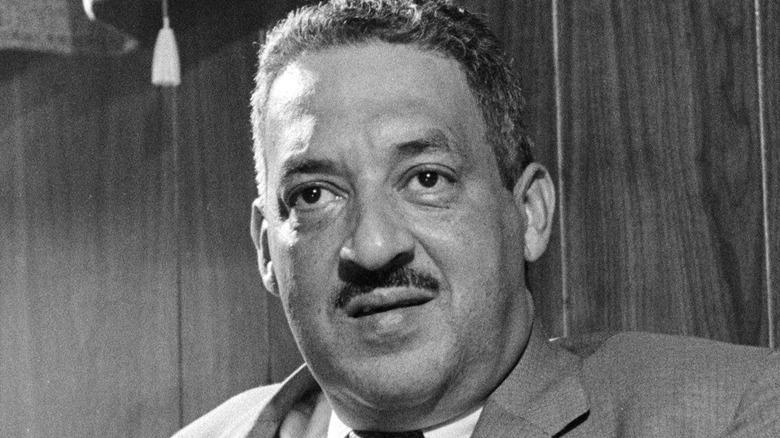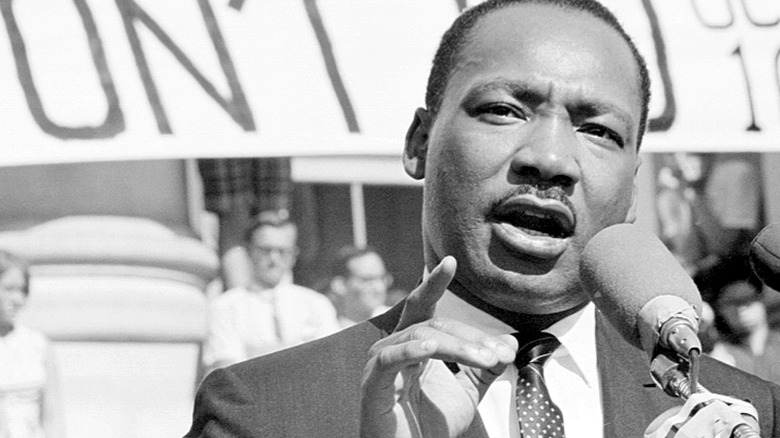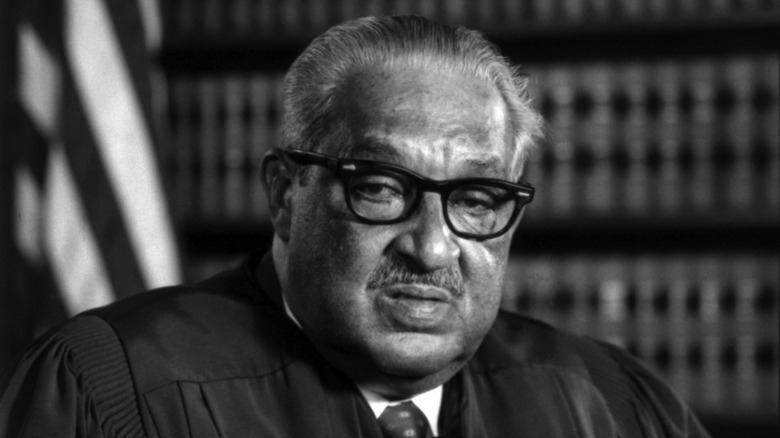Why Thurgood Marshall Wasn't A Huge Fan Of Martin Luther King Jr.
By becoming the first Black U.S. Supreme Court Justice, Thurgood Marshall made history on August 30, 1967. He had been nominated by President Lyndon Johnson just two months earlier, and was the first Black person in America to earn such a nomination. Marshall took on the lifelong commitment to the Supreme Court, where he served for 24 years until his retirement in 1991. He died two years later, in 1993, at the age of 84.
Even before, and then during, his law career he was a well-known figure of the Civil Rights movement. Marshall served as the head legal counsel for the National Association for the Advancement of Colored People (NAACP). He also founded the organization's Legal Defense and Education Fund. In that role he argued many cases, most famously Brown v. Board of Education in 1954, a major landmark case that he won, which ruled that segregation in schools was unconstitutional (via US Courts). It was a big win for Black Americans and Marshall as a lawyer for civil rights.
Marshall v. King
Another prominent figure of the movement was a minister, Dr. Martin Luther King Jr. In fact, the two knew each other very well — well enough that they would clash on their personal views of how to go about dealing with America's mistreatment of and infringement of the rights of Black people.
A few years after Marshall scored his major Brown v. Board of Education victory, in 1958, Dr. King wrote a letter of thanks to Marshall to express his appreciation for his support of his Montgomery bus boycott, per Stanford University King Institute. But despite their common interests and concerns, the two would find themselves at odds with one another. They had differing views on how to go about obtaining equal rights and fighting racism. As a lawyer, Marshall took his battles to courthouses, eventually the highest court of the land. Dr. King organized his battles by engaging in non-violent protests, says The Washington Post. And Marshall wasn't a huge fan of that, as a lot of those demonstrations and marches ironically turned violent, particularly due to confrontations with police, and ended with arrests. For Marshall, this was the opposite of what he was fighting for, and it went against his principles of following the law. "I used to have a lot of fights with Martin about his theory about disobeying the law. I didn't believe in that," Marshall once said, quoted by The Washington Post.
Marshall could never agree with King's views
For most of the 1950s, Marshall was a recognizable name and face of the movement. But Dr. King entered the picture in the late '50s and quickly rose as the new leading voice. By then Marshall moved past his position in the Civil Rights movement, as he was a rising judge who would later work with President Johnson's administration. During the Vietnam War during the 1960s, Marshall would publicly disagree with Dr. King, telling the media that King's criticism of U.S. policies didn't need to extend to international wars. And at a meeting both men attended with religious leaders in St. Louis, Missouri, Marshall walked out of it in a public display to show his disapproval of King attempting to organize a demonstration that would include civil disobedience, per The Marshall Project. "I am a man of law, and in my book anarchy is anarchy is anarchy," Marshall said at one point (via The Washington Post). Marshall to the battle to the courts; King took it to the streets.
The two men would eventually find common ground when it came to critiquing other, more revolutionary Black Civil Rights champions, who didn't care for either man's non-violence mantras or justice in the courthouse. But even after the King assassination, Thurgood Marshall could never bring himself to see eye to eye with Martin Luther King Jr.


